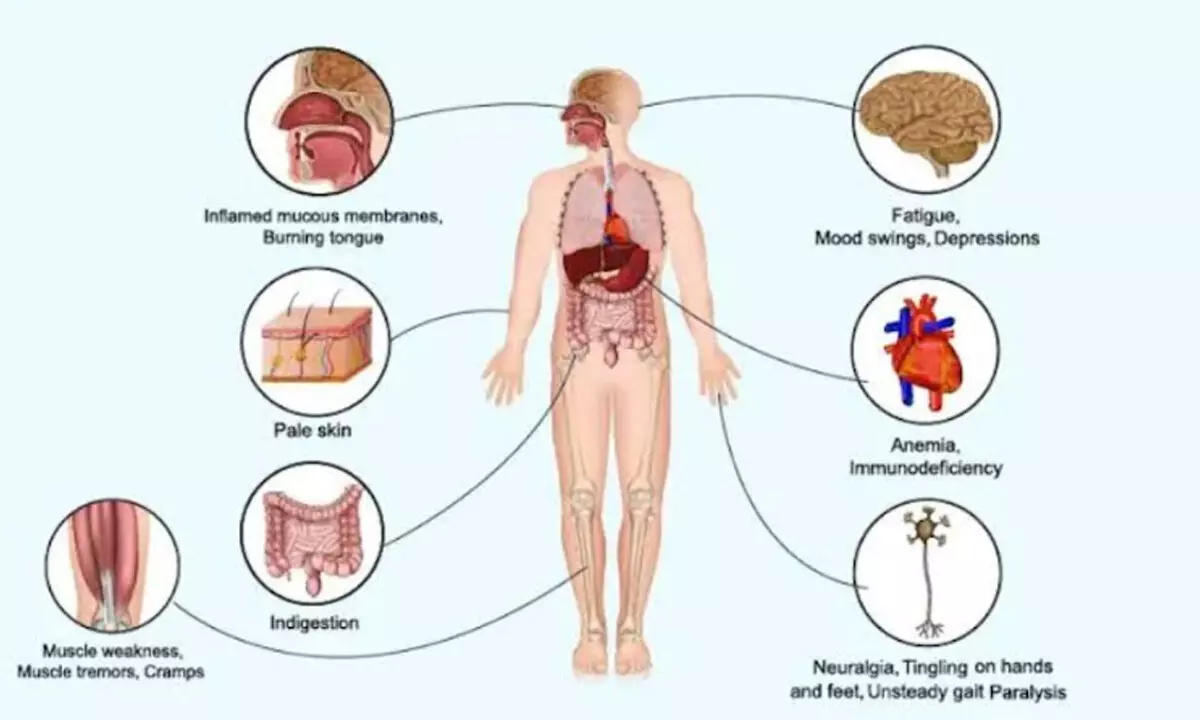5 Signs of Vitamin B12 Deficiency

Vitamin B12 deficiency may cause tiredness, weakness, pale or jaundiced skin, tingling in the hands and feet, and memory problems. It is vital for red blood cell production and nerve health, so seek medical advice if symptoms occur.
Vitamin B12 is an essential nutrient that plays a crucial role in red blood cell production, DNA synthesis, and the proper functioning of the nervous system. If you have a deficiency in this vitamin, you can develop a number of symptoms, some of which can be quite debilitating if you don’t treat them. If you’re experiencing any of the symptoms mentioned above, it’s important to see a healthcare provider and consider adding Neurobion Forte to your routine early on.
Here are five key signs that may indicate a deficiency in vitamin B12:
1. Persistent Fatigue and Weakness
Some of the earliest and most common symptoms of vitamin B12 deficiency are fatigue and general weakness. This happens because a shortage of B12 means the body cannot make enough red blood cells to transport oxygen throughout the body. When oxygen delivery is decreased, energy levels drop, and you feel tired even after getting enough rest.
The symptom can affect everyday activities like climbing stairs or carrying groceries. If you suffer from chronic fatigue for long enough, it will take a considerable toll on your life; therefore, it’s important to find and address the cause of the problem.
2. Pale or Jaundiced Skin
Vitamin B12 deficiency can cause your skin to appear unusually pale or even slightly yellow, a condition commonly known as jaundice. This occurs because a lack of B12 leads to problems with red blood cell production. Bilirubin, a yellow pigment, is released into the bloodstream as the red blood cells become fragile and break down, giving your skin and the whites of your eyes a yellowish tint.
Even if you’re feeling fine, pale skin can make you look tired or unwell. This change in complexion can be a very strong indicator of a vitamin B12 deficiency combined with other symptoms such as fatigue. If you start to notice these changes to your complexion, it could be a sign that you are low in this vital nutrient.
3. Tingling Sensations and Nerve Problems
Developing neurological symptoms such as tingling or numbness in the hands and feet can be one of the more concerning symptoms of a vitamin B12 deficiency. This is because vitamin B12 is needed to maintain the protective myelin sheath that surrounds nerves. If you don’t have enough B12, the myelin sheath can be damaged, which can lead to nerve problems.
This condition, known as peripheral neuropathy, can cause a range of sensations, including tingling, numbness, burning, or a “pins and needles” feeling. Without treatment, untreated nerve damage can progress, leading to coordination issues and even difficulty walking.
4. Cognitive Impairments and Memory Issues
In addition, vitamin B12 deficiencies can also affect brain function and cause problems like memory loss, confusion, or the inability to concentrate. For instance, you may forget to make appointments, struggle to remember new information, or feel mentally 'foggy' all day long. They can lead to cognitive impairments that affect work performance, relationships, and general quality of life. These symptoms are particularly concerning as they can mimic those of dementia or other neurological conditions. The good news is that a majority of these issues are reversible with early intervention and treatment.
5. Mood Changes and Depression
Vitamin B12 deficiency has been associated with depression and irritability. Vitamin B12 plays a role in the production of brain chemicals that influence mood, such as serotonin. If you don’t have enough B12, these chemicals can become imbalanced and cause symptoms of depression or mood swings.
This might lead to increased feelings of sadness, anxiety, or a lack of motivation. These mood changes can happen independently or with other symptoms of B12 deficiency, so it’s important to consider the whole picture.
Risk Factors for Vitamin B12 Deficiency
Before addressing these symptoms, it’s important to know what the risk factors are that may make someone more likely to develop vitamin B12 deficiency. These include:
- Following a vegetarian or vegan diet, as vitamin B12 is primarily found in animal-based foods like meat, fish, and dairy.
- Ageing, as older adults may absorb B12 less effectively due to decreased stomach acid production.
- Medical conditions like pernicious anaemia or gastrointestinal disorders like Crohn’s disease and celiac disease interfere with B12 absorption.
- Certain medications, including proton pump inhibitors and metformin, can affect B12 levels.
Understanding these risk factors allows you to take proactive steps to maintain healthy vitamin B12 levels through diet, supplements, or fortified foods.
Overall, it’s important to act promptly if you’ve noticed any of these symptoms. Adding a vitamin B12 supplement, like Neurobion Forte, can help restore your levels and ease your symptoms. Always check with your healthcare provider to determine the appropriate dosage and treatment plan for your needs. In addition to this, maintaining a balanced diet that includes vitamin B12-rich foods, such as eggs, dairy products, fish, and fortified cereals, can help prevent deficiencies in the future. Regular screenings and proactive supplementation can be life-changing for those at higher risk.
(No Hans India Journalist was involved in creation of this content)














